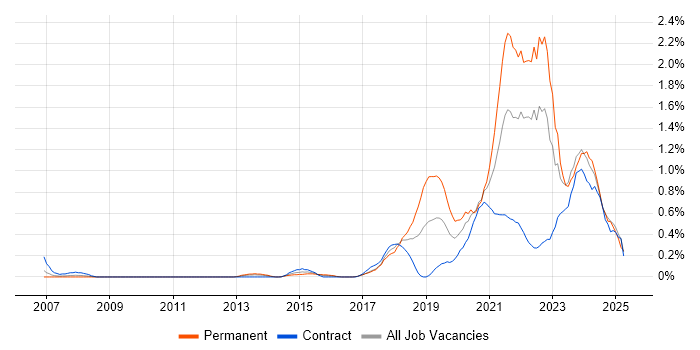Data Engineering
Scotland > Glasgow
The table below provides summary statistics for permanent job vacancies advertised in Glasgow requiring Data Engineering skills. It includes a benchmarking guide to the annual salaries offered in vacancies that cited Data Engineering over the 6 months leading up to 7 May 2025, comparing them to the same period in the previous two years.
| 6 months to 7 May 2025 |
Same period 2024 | Same period 2023 | |
|---|---|---|---|
| Rank | 51 | 160 | 98 |
| Rank change year-on-year | +109 | -62 | -1 |
| Permanent jobs citing Data Engineering | 3 | 72 | 28 |
| As % of all permanent jobs advertised in Glasgow | 0.61% | 1.81% | 1.78% |
| As % of the Processes & Methodologies category | 0.68% | 1.87% | 1.85% |
| Number of salaries quoted | 1 | 7 | 3 |
| 10th Percentile | - | £64,000 | £55,200 |
| 25th Percentile | £105,000 | £72,500 | £57,000 |
| Median annual salary (50th Percentile) | £110,000 | £80,000 | £60,000 |
| Median % change year-on-year | +37.50% | +33.33% | -0.83% |
| 75th Percentile | £115,000 | £85,000 | £71,875 |
| 90th Percentile | - | - | £79,000 |
| Scotland median annual salary | £55,000 | £70,000 | £67,500 |
| % change year-on-year | -21.43% | +3.70% | +17.39% |
All Process and Methodology Skills
Glasgow
Data Engineering falls under the Processes and Methodologies category. For comparison with the information above, the following table provides summary statistics for all permanent job vacancies requiring process or methodology skills in Glasgow.
| Permanent vacancies with a requirement for process or methodology skills | 439 | 3,850 | 1,514 |
| As % of all permanent jobs advertised in Glasgow | 89.78% | 96.69% | 96.19% |
| Number of salaries quoted | 252 | 817 | 664 |
| 10th Percentile | £32,625 | £31,250 | £32,500 |
| 25th Percentile | £43,938 | £41,250 | £41,250 |
| Median annual salary (50th Percentile) | £58,033 | £54,000 | £55,000 |
| Median % change year-on-year | +7.47% | -1.82% | +13.40% |
| 75th Percentile | £77,125 | £65,000 | £70,000 |
| 90th Percentile | £94,175 | £77,700 | £77,500 |
| Scotland median annual salary | £55,000 | £52,500 | £57,500 |
| % change year-on-year | +4.76% | -8.70% | +8.49% |
Data Engineering
Job Vacancy Trend in Glasgow
Job postings citing Data Engineering as a proportion of all IT jobs advertised in Glasgow.

Data Engineering
Salary Trend in Glasgow
3-month moving average salary quoted in jobs citing Data Engineering in Glasgow.
Data Engineering
Co-occurring Skills and Capabilities in Glasgow by Category
The follow tables expand on the table above by listing co-occurrences grouped by category. The same employment type, locality and period is covered with up to 20 co-occurrences shown in each of the following categories:
